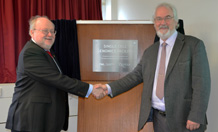
Pictured: Professor Sir Steve Smith (left), with Professor Stephen de Mora (right).
New £1M facility to reveal the secrets of marine microbial communities one member at a time
University of Exeter and Plymouth Marine Laboratory have unveiled a state of the art facility for the study of environmental microbes.
The environmental Single Cell Genomics facility (eSCG), funded by the Natural Environment Research Council and the Wolfson Foundation, has been created to study the genomic characteristics of individual cells without the usual requirement to culture and grow them. The facility, which boasts cutting-edge cell sorting equipment, liquid handling robotics and molecular biology analysis tools, is housed within an ultraclean room to prevent contamination.
Drs Mike Allen (PML) and Ben Temperton (University of Exeter, UoE) worked together to design and coordinate the creation of the new facility. Dr Allen said: “Working with single cells is incredibly powerful as a research tool. It allows us to deconstruct complex communities and look at the individual components without the background ‘noise’ we usually get from mixed populations. It’s not easy though, a single particle of dust can ruin everything, which is why the facility operates under conditions normally associated with high-tech microchip manufacturing.”
Dr Temperton, Lecturer in Bioinformatics at UoE commented: “This facility brings together the strengths of PML and University of Exeter in a world-class laboratory, to provide a much needed single-cell genomics capability to UK marine science and the broader research community. It means we can now examine the genomes of any microbe we are interested in, irrespective of whether we can grow it in a lab, and study the function and evolution of communities with incredible detail. It’s the genomic equivalent of switching from using binoculars to the Hubble telescope to study the stars.”
Equipment within the facility can separate and isolate specific individual cells (and viruses) and then characterise their contents using molecular techniques. Used together in tandem, the possibility exists to study not just what individual cells are present, but also what they are doing and precisely how they are doing it. It is expected that eSCG will become a focal point for UK and international scientists to unlock the mysteries of unculturable and novel organisms from the environment.
“Thanks to NERC and Wolfson, we have been able to create a really special facility. Some of the technologies we now have at our disposal are mind-blowingly sensitive and accurate. In addition to other state-of-the-art equipment and instruments, the facility also harbours the world’s fastest atomic force microscope” says Dr Allen. “Yesterday, I was looking at individual DNA strands on a screen. I still can’t quite believe the resolution we’re getting.”
“Through eSCG, scientists will be able to study the genomes of any organism of interest, and crucially, whilst only needing a single cell to do it. Through the partnership between PML and the University of Exeter, the South West will take a global lead in training the next generation of researchers in this important technique to gain insight into evolution, functional biodiversity and climate change.”
PML Chief Executive Professor Stephen de Mora commented at the opening of the facility: “I am thrilled to open this new facility which is the first of its kind in the UK and represents an important strategic move by the Plymouth Marine Laboratory and the University of Exeter in this exciting research area, shaping the future of biogeochemistry”.
Professor Sir Steve Smith, Vice-Chancellor and Chief Executive of the University of Exeter said: “I am delighted to help open this exceptional, world-class facility located here in the South West region. This pioneering collaboration between the University of Exeter and PML will not only bring together our major areas of research expertise, but will also play a pivotal role in teaching the next generation of global-leading researchers in this critical field of study.”
Funding from the Wolfson Foundation is awarded following rigorous and independent expert review. Paul Ramsbottom, Chief Executive of the Wolfson Foundation, said: “We were very impressed by the expertise and research agenda at the Plymouth Marine Laboratory. Marine biology is facing unprecedented environmental challenges, and we are very pleased to be supporting the eSCG, which is a striking example of the research excellence that the Wolfson Foundation seeks to support and promote.”
Date: 20 May 2016
